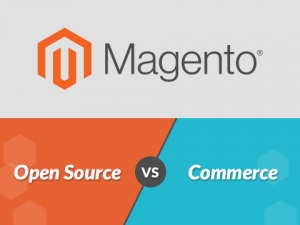What are the differences between Magento Open Source vs Magento Commerce?
30 November 2018

Open Source vs Magento Commerce?
Why Magento?
If you’re researching the best ecommerce system for your business, Magento should certainly be on the list due to its prominence within the ecommerce market (approximately 13% of ecommerce websites in the world are running of this platform according to BuiltWith) and because it offers a free ecommerce system. Magento is a well-supported system, benefiting from a well-developed ecosystem with various modules and extensions available to allow your website to evolve with your needs and provide more products/services to your customers as time goes on.
Magento are at the forefront of ecommerce and invest heavily in new features and versions of their ecommerce systems. They are also supported by a global network of creative digital agencies which are carefully vetted, working to high standards and using Magento certified expert developers. Here at Absolute, we’re one of 45 Magento Solution Partners in the UK. We have been in business for over 24 years (read more about our team here).
Key differences between Magento Open Source and Magento Commerce
Magento is provided in two versions, Magento Open Source and Magento Commerce. You might have also read online about Magento 1 and Magento 2, this is because these terms are used interchangeably by online commentators. Due to Magento constantly updating features of the two systems it can be quite easy to confuse the two. We’ve put together a brief summary of the key difference between the systems to help guide you in choosing the right version of Magento.
Magento Open Source
Previously known as Magento Community Edition on M1, Magento Open Source on M2 is a free, out-of-the-box version of Magento which facilitates the creation of online stores for SMEs. As the name indicates, the system is open source, so owners can transfer the code from one agency to another if required and the full core source code is available to everyone.
This version of Magento includes key features you would expect for a modern ecommerce system, including an integrated checkout, mobile/table optimised templates, ability to sell globally, the ability to manage your product catalogue, access to the module Marketplace, instant purchase and site search.
However, this version of Magento must be hosted on premises or by a third-party as Magento’s own cloud hosting isn’t an option. Database clustering support is not available in Magento Open Source, so the site is relatively harder to scale for a large volume of concurrent users, or intensive site administration such as processing thousands of daily orders.
Magento Commerce
Magento Commerce, previously known as Magento Enterprise Edition on M1, is geared towards medium and large businesses.
Compared to Magento Open Source, this version is much more powerful, containing many more features and combining the out-of-the-box functionalities one would find in Magento Open Commerce with enterprise level performance, scalability and reporting functionalities. This makes it ideal for fast-growing medium sized businesses and large businesses looking for a system that allows them to work more intelligently.
Magento Commerce comes in two variations; Magento Commerce Starter and Magento Commerce Pro. We’ve outlined below some of the key features that are available in each version of the system.
Magento Commerce ‘Starter’ features
- 1) Content staging and preview: This feature permits Administrators to create, schedule and preview a range of content on the website
- 2) Page builder: Includes the new WYSIWYG page builder function allowing Administrators to use the system’s built-in CMS to create custom pages
- 3) Visual Merchandising: Ability to organise products on catalogue pages faster and easier using various variables (such as most popular sales item)
- 4) Customer Loyalty tools: Includes functionalities permitting the setting up of reward points, wish lists and private sales events
Magento Commerce ‘Pro’ features
- 1) B2B functionality: A core focus of Magento Commerce Pro is the further empowering of companies engaged in enterprise level, business-to-business sales and aims to work well for users and administrators alike. Business users are able to create company accounts, whilst Administrators are able to set-up multiple buyers, create custom catalogues and pricing lists. The quoting process is streamlined to encourage further engagement between buyers and sellers
- 2) Enhanced Marketing Tools: Administrators are able to access predefined reports on sales, marketing, customers and are also able to create and edit reports as required. Both Magento and Google Analytics data is available. Dashboards are available and data can be exported into CSV or excel formats
- 3) Support: Dedicated Account Managers and a support team available 24/7 are provided as part of the package
- 4) Managed cloud: Reliable and secure cloud hosting
So what does all of this mean?
Price, visual content editing, reporting capabilities and B2B features are the key differentiators between the two systems, with Magento Commerce being more expensive due to its more advanced capabilities and additional support services provided by Magento themselves. Nevertheless, administrators using both systems (as they’re both open-source) can customise their websites and can easily change suppliers. In contrast, a website built on a proprietary ecommerce system can only be maintained by one party, customisation is limited or impossible and content can’t be transferred to a different platform without incurring significant costs.
If a site built on Magento Open Source outgrows the platform, for example hitting scalability issues due to transaction volume, there is an upgrade path to Magento Commerce. Similarly, whilst many of the features in Commerce edition can be achieved via extensions to Open Source, there is a tipping point around which it could be a false economy to build on Open Source rather than Commerce. The usual advice is that sites turning over £1m annually should strongly consider the added confidence and featureset provided by Commerce edition.
One thing to be aware of is that security support for Magento 1 Open Source will be discontinued in June 2020. As a result your website will become more vulnerable to potential security breaches by malicious parties. With the introduction of the GDPR legislation in May 2018, and in light of existing PCI regulations, such breaches now carry significant penalties.
As a Magento Partner, we’ve a team of Magento certified Developers and a dedicated support team at your disposal to ensure issues with Magento are resolved efficiently. If you’re unsure of what version of Magento you require, why not get in touch and we’ll help with the decision making process.
Alternatively, if you’re thinking about making the move to Magento 2 sign up for our free Magento 2 demo with one of our experts.
Contact Us to discuss how we can help increase sales and boost your online performance!
INSIGHTS
CASE STUDIES

Fired Earth - Shopify Plus
Fired Earth’s move to Shopify Plus marked a major transformation for their B2C and B2B operations, streamlining their product catalogue and delivering a faster, more adaptable eCommerce experience, supporting growth and enhanced customer engagement.
-
Shopify

Carluccio's Coffee Subscription
Discover how we helped Carluccio’s transform their online coffee products, creating a bespoke design, unique user journey and efficient user experience, resulting in an eye-catching subscription service, seamlessly integrated with their Shopify site.
-
Shopify
CONTACT
Are you excited to get your next project up and running? Or are you unsure what is dragging you down?
Contact Us to discuss how we can help increase sales and boost your online performance!

Enter your email address to sign up to our newsletter, featuring case studies, insights, industry news and much more.
If this is something you would like help with, please get in touch.






